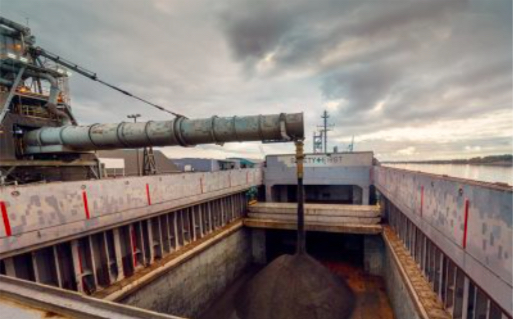forum
library
tutorial
contact

Port of Vancouver USA, Columbia Riverkeeper
Reach Agreement Settlement
by Joanna Yorke-Payne
Vancouver Business Journal, September 14, 2023
|
the film forum library tutorial contact |

|
Port of Vancouver USA, Columbia Riverkeeper
by Joanna Yorke-Payne
|
The legal agreement settles a Clean Water Act lawsuit challenging
years of alleged unlawful water pollution from the Port
 On Sept. 11, Columbia Riverkeeper announced via news release that the organization and the Port of Vancouver USA reached an agreement settling a Clean Water Act lawsuit challenging years of alleged unlawful water pollution from the Port. According to the news release, in the settlement, the Port committed to make significant changes to reduce the amount of water pollution that flows off the 1,643-acre property and into the Columbia River.
On Sept. 11, Columbia Riverkeeper announced via news release that the organization and the Port of Vancouver USA reached an agreement settling a Clean Water Act lawsuit challenging years of alleged unlawful water pollution from the Port. According to the news release, in the settlement, the Port committed to make significant changes to reduce the amount of water pollution that flows off the 1,643-acre property and into the Columbia River.
Before it can go into effect, the proposed settlement must undergo a 45-day review period by the U.S. Department of Justice and then be approved by a federal district court judge.
"As a Port who's won awards for environmental stewardship we strongly dispute the claims made in this legal maneuver, and all along have been confident the complainant would eventually agree to put them to rest," said Casey Bowman, director of communications at the Port of Vancouver USA.
The Port of Vancouver USA is one of the largest public ports in Washington state. Port facilities include the five marine terminals and waterfront industrial property with direct connections to the Columbia River, main-line rail and interstate highway. Cargo handling specialties include bulk cargos and breakbulk commodities with dedicated shipping facilities for grains, mineral ore, automobiles and agricultural commodities.
"Today's settlement is a big win for clean water and everyone who values the Columbia's iconic salmon and the people and cultures that rely on them," Columbia Riverkeeper Executive Director Lauren Goldberg said in the news release. "Public ports have a critical role to play in keeping the Columbia swimmable and fishable for all."
According to Columbia Riverkeeper's news release, Brian Knutsen, a partner at Kampmeier & Knutsen, PLLC, and attorney representing Columbia Riverkeeper, said that available information, including the Port's water quality sampling data, suggest that the Port is the single largest industrial source of unhealthy copper levels in the lower Columbia River over the last decade. As a part of this settlement, the Port agreed to work with their tenant that handles copper ore, Vancouver Bulk Terminal, to install a $25.5 million "rotainer system." Under the new system, the terminal will receive and store copper ore in fully enclosed containers. This will significantly reduce the amount of copper entering the Columbia, according to Columbia Riverkeeper's news release.
Bowman said that the Port's directive all along concerning the retainer system -- meaning nearly a year prior to this lawsuit ever being filed -- was to have the bulk mineral operator make the $25.5 million investment.
"The Port of Vancouver's strong environmental record includes literally writing the blueprint for stormwater management innovations, so we gladly agreed to enumerate a list of actions that line up with our proactive approach to protecting the Columbia River watershed -- including multiple that were already underway," Bowman said. "For instance, we were already pursuing the installation of a cutting edge ‘rotainer' system to handle copper at the Port nearly a year before this lawsuit was filed, so we're pleased that the complainant learning about this Port-led initiative contributed to its decision to put this lawsuit to rest."
Columbia Riverkeeper also filed Clean Water Act claims against the previous tenant at the Port handling copper, Metropolitan Stevedore Company. According to the news release from Columbia Riverkeeper, both Metro and Vancouver Bulk Terminal have been joined to the Columbia Riverkeeper's lawsuit against the Port and claims against them are settled as a result of today's settlement.
As part of the settlement, the Port of Vancouver agreed to make several other improvements to its facility to reduce industrial pollution, including: develop and implement an operations and maintenance plan for the bioretention treatment system at Terminal 2, relocate metal stored in the boneyard near the maintenance shop to a location where it will not come into contact with precipitation or stormwater runoff, develop and implement a study to identify the locations most responsible for exceedances of the port permit's benchmark for total copper, and purchase a Vactor truck to reduce stormwater pollution.
To reduce harm from its pollution and deter any future Clean Water Act violations, the settlement requires the Port to make a payment-in-lieu-of-a-penalty of $500,000 to the Lower Columbia Fish Recovery Board (LCRFB), the Regional Salmon Recovery Organization and Lead Entity for salmon habitat restoration for the lower Columbia River in Southwest Washington. The LCFRB works with a diversity of partners to recover salmon, steelhead and bull trout populations to healthy, harvestable levels by guiding implementation of the federally adopted recovery plan. The Port has also agreed to fund and implement a $150,000 project to improve water quality in Vancouver Lake, to be completed by January 2024.
"Now the Port can re-focus its resources back on the proactive approach to operating responsibly that has made us a leader in the port industry when it comes to protecting the Columbia River watershed," Bowman said.
Related Pages:
Vancouver Fined $60,000 for 2017 Columbia River Sewage Spills by Molly Solomon, Oregon Public Broadcasting, 1/4/19
Port must Fix Runoff at PDX by Alex Pulaski, The Oregonian, 10/17/6
learn more on topics covered in the film
see the video
read the script
learn the songs
discussion forum
